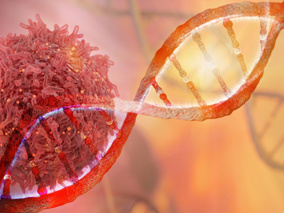Colon Cancer - Hereditary / Lynch Syndrome
Colon cancer is one of the most common types of cancer. Every year, 12,000 people in the Netherlands are diagnosed with this disease. About 5 out of 100 people have a hereditary form of colon cancer. The most common hereditary form is called Lynch syndrome.
Of all people with colon cancer, about 4% have Lynch syndrome. The Netherlands Cancer Institute is a recognised centre of expertise for hereditary tumours in the stomach, intestines and liver.
On this page you can read more about Lynch syndrome.
More information about Lynch syndrome
Causes of Lynch syndrome
Lynch syndrome is hereditary. You are then more likely to develop cancer. Especially on colon cancer and uterine cancer. These types of cancer can develop at a young age. Someone with Lynch syndrome can also get more than one cancer. Often family members have also had cancer.
Symptoms of Lynch syndrome
Lynch syndrome itself does not cause any symptoms or complaints. Possible symptoms of colon cancer due to Lynch syndrome may include:
- Blood in the stool
- (sudden) change in the stool pattern and/or you always have abdominal pain
- Losing weight for no reason
- Fatigue
These symptoms do not always mean that you have colon cancer. It is good to have this investigated.
Hereditary predisposition
Signs of a hereditary predisposition in the family can be:
- The same type of cancer occurs in several family members
- Someone gets cancer at a young age
- One person gets cancer twice
- A certain combination of different types of cancer (for example, colorectal cancer and uterine cancer) occurs in one person or within one family.
How do I recognize Lynch syndrome?
To trace families with suspected Lynch syndrome, taking a family history is important. They then ask which types of cancer occurred in family members. For example, with children, brothers, sisters, parents, uncles, aunts or grandparents. This way, people with Lynch syndrome can be found earlier. Then they can start bowel examination on time.
Adenomatous polyps can be precursors to colon cancer. In people with Lynch syndrome, these polyps grow into cancer more quickly: in 2 to 3 years. In people without Lynch syndrome, this usually takes 7 to 10 years, or longer.
With a colonoscopy (an exploratory examination of the intestine), the doctor can detect colon cancer early. The doctor can therefore remove adenomatous polyps in time.
The team
The team that is mainly concerned with Lynch Syndrome are the clinical geneticists and genetic counselors listed below.
Gastroenterologists
Genetic counselors
Clinical geneticists
Nurse Practitioner
Waiting
We want to inform you as well as possible about the waiting time per condition. We do this based on a prognosis of the current waiting list. The waiting time can vary from patient to patient for various reasons. Your attending physician will give you more information during your outpatient consultation.
-
7 days
First appointment
This is approximately how long it will take until you have your first appointment
-
4 days
Rapid diagnostics
This is approximately how long it will take before you can start rapid diagnostics at the NKI
-
8 days
Second opinion
This is approximately how long it will take before you come in for a second opinion at the NKI
 nl
nl



